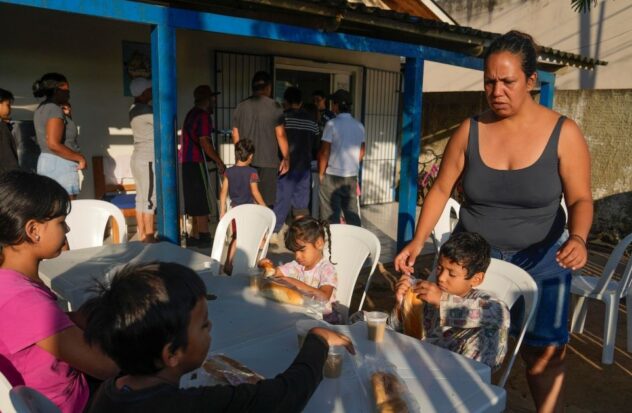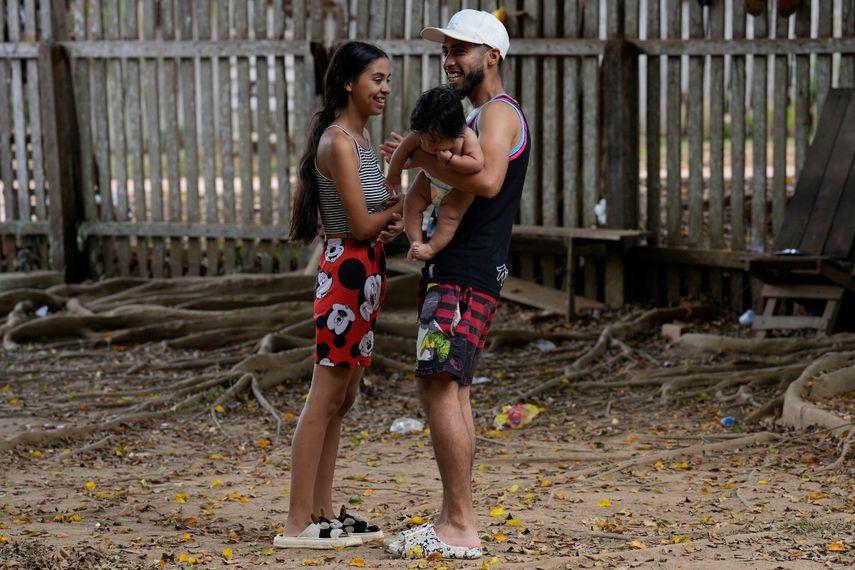Johany “Flaca” Rodriguez, 48, was ready to leave the hardships of life in Venezuela behind. She has been waiting in the shelter that houses 45 people in Assis Brasil, a town of 7,000 people on the border with Peru, because others have told her how complicated the journey to the United States has become.
Migrants, police, officials and analysts say Biden’s actions have created a wait-and-see attitude among migrants in Latin America’s largest economy, at least for now. As anywhere along the routes they take to their hoped-for new lives, local communities are struggling to meet the needs of the new populations.
After sleeping on dirty mattresses and in half-ripped hammocks and eating rice, beans and minced meat, Rodriguez decided this month that she and her dog Kiko would spend a few weeks with friends in the southern state of Rio Grande do Sul.
Wearing a headband, leggings and a small backpack, Rodriguez rose early to walk more than 100 kilometers (62 miles) in two days to a nearby town of 27,000 people. There she hopes to earn some money and take a bus south to reach the United States one day.
“I have to stay here until it is safer to leave,” Rodriguez said. “I am not very happy about staying (in Brazil) but it is what I can do.”
Brazil has seen waves of migrants heading toward North America in the first part of the year. There were Indians, Bengalis, Senegalese and Nigerians, among other nationalities, said Rêmullo Diniz, coordinator of Gefron, the Acre state police unit for border operations.
When Biden announced the new measures, many in those groups began staying in their countries rather than traveling to Latin America, according to Brazilian government officials and independent analysts. For citizens of the region, it’s easier: Brazil allows residents of 10 neighboring countries to stay for up to two years without a visa.
The U.S. government said last week that apprehensions for illegal entry from Mexico have fallen by more than 40% since asylum processing at the border was temporarily suspended on June 5. Arrests have fallen to fewer than 2,400 a day for the first time under Biden.
The state of Acre offers a snapshot of the attitude of many migrants, and raises the possibility that the region and other stopping points could become long-term options.
Assis Brasil has little to offer migrants except the wooden shelter where Rodriguez was staying and a school gym that sleeps 15 men. There are two small hotels and a bus stop used by vans crossing into Peru. It has five restaurants along its main road, two grocery stores and an ice cream shop offering Amazonian flavors such as those made from cupuaçu and taperebá fruits. Migrants often beg for money in the town’s only square.
There are three flights a day to the state capital, Rio Branco, where Jay, 21, arrived from India with the intention of travelling to the United States to study engineering.
Wearing a white cap that read “RIO DE JANEIRO,” Jay, who declined to reveal his last name or hometown, said it would “take too long if I just sat there waiting” in India.
“It is a long and very risky journey. But it is my dream to study there and I will achieve it,” she said.
Brazil’s westernmost state is a remote enclave in the middle of the jungle, used by tourists as part of an alternative route to visit Cusco, the capital of the ancient Inca empire in Peru.
One of the main draws to Assis for locals is sitting on the benches in its square, Senador Guiomard, watching football on television and eating barbecue. The founders of this small town arrived in the Amazon in 1908 to start a rubber plantation that, 50 years later, became a city. Not much has changed since then, despite the BR-317 highway that runs through the area, the only land connection between Brazil and Peru. When residents get bored, which happens often, they head to the neighboring Peruvian town of Iñapari for a drink, usually a pisco sour.
Venezuelan Alexander Guedes Martinez, 27, said he will stay as long as it takes to get more money and, perhaps in a year, go to Houston, where he has family. He arrived with his 17-year-old partner and their five-month-old baby.
At the Assis Brasil shelter where they were staying last month, he said he hopes to “return to Venezuela and obtain key documents to try to cross the border in a better way.”
“I want to be more cautious for my daughter,” he said. “Being here helps.”
The state patrol in Acre has about 40 officers to patrol the 2,600-kilometer (1,615-mile) border with Peru and Bolivia. A main highway connects the three countries, but local police say many migrants are also moving through the jungle, some of them carrying drugs.
Miguel Hidalgo, a 52-year-old Cuban, tried to enter the United States years ago. He left the island for Suriname and later ended up in Brazil, from where he does not plan to leave anytime soon.
“I like Brazil. I have only been here for a short time, but people are not prejudiced against me, people are lovely,” he said. “I want to live like a human being. I am not asking for riches. I want to live in peace, to help my family in Cuba.”
Acre Gov. Gladson Camelli said in a statement to The Associated Press that he is concerned about the possible arrival of more South American migrants soon.
“Our government has tried to do its part in providing humanitarian assistance,” he said.
Assis Brasil Mayor Jerry Correia is also bracing for increased demand. His government feeds about 60 migrants a day and voters are unhappy in a municipal election year.
“This is all on our shoulders. This is a policy that has to be managed by the federal government,” Correia said. “People don’t know what is happening at our border. We need to be seen.”
Source: AP




